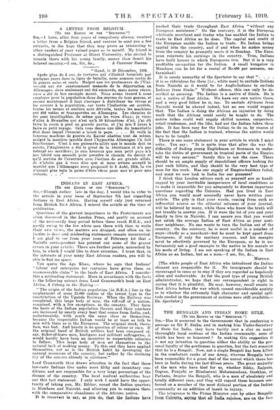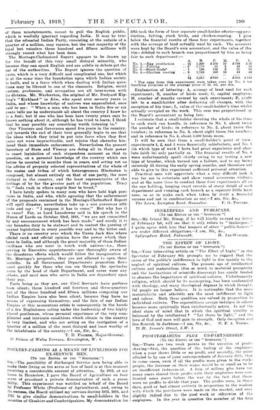THE BENGALIS AND INDIAN HOME RULE. [To ran Enema or
7111 `• Eltscraroz."] Sia,—Has it occurred to the Government that in conferring e peerage on Sir P. Sinks, and in making him Under-Secretary of State for India, they have tacitly cast a slur on many thoroughly loyal sections of the Indian community, none of which has been so honoured ? In making this suggestion it is not my intention to question either the ability or the per- sonal loyalty of the gentleman in question, but the fact remains that be is a Bengali. Now, not a single Bengali hats been killed in the combatant ranks of one Array, whereas Bengalis have been responsible for a great deal of the unrest which there has been in India during the last fifteen years. The great majority of the men who have bled for us, whether Sikhs, Raleuts, Dogma, Punjabi or Hindustani Mohammedans, Gurkhas, or Pathan, despise the Bengali, who is a man of absolutely and totally different race, and they will regard these honours con- ferred on a member of the most disloyal portion of the Indian community as an addition of insult to injury.
The telegrams to the Prime Minister sent by other Bengalis from Calcutta, saying that all India rejoices, are on the face of them misstatements, meant to gull the English public, which is woefully ignorant regarding India. It nosy be true that the educated Indian Party, consisting at the outside of a quarter of a million, may rejoice, but the vast majority of the loyal but voiceless three hundred and fifteen millions will strongly resent what has been done.
The Montagu-Chelmsford Report appears to be drawn np for the benefit of this very small disloyal minority, who because they can speak English and are subtle in debate get the ear of the authorities. The Report ignores the question of caste, which is a very difficult and complicated one, but which is at the same time the foundation upon which Indian society is built, and is a force which when dealing with Indian ques- tions may be likened to one of the elements. Religion, social custom, profession, and occupation are all interwoven with its dictates. Mr. Warburton, the original of Mr. Rudyard Kip- ling's "Kirkland" in Kim, who spent over seventy years is India, and whose knowledge of natives was unparalleled, once said to me: " When a man who hoe been in India flee or six years tells me he understands all about the country I know he is a fool; but if one who has been here twenty years says he knows nothing about it, although he has tried to learn, I think that he may possibly say something worth listening to." Oar Viceroys and Governors spend five years in the country, and towards the end of their tour generally begin to see that the ideas which they tried to put into force when they first came out were impracticable, and rejoice that obstacles hin- dered their immediate enforcement. Nevertheless the present Secretary of State and Viceroy are doing all in their power to enact legislation of mock stupendous moment as that in question, on a personal knowledge of the country which can better be counted in months than in years, and acting not on the advice of properly selected representatives of the whole of the castes and tribes of which heterogeneous Hindustan is composed, but almost entirely on that of one party, the most disloyal in the country, and the least representative of the feelings of by far the greater part of the population. Trolly in "fools rush in where angels fear to tread."
I have lately spoken to many men who have held high peed- tions in India, and who, while agreeing that the enforcement of the proposals contained in the Montagu-Chelmsford Report will spell disaster, nevertheless take up a non possumut atti- tude and say: "I suppose it has to come." But why has it to comeP For, as Lord Lansdowne said in his speech in the House of Lords on October 23rd, 1919, "we are not committed by any announcement which has been made," and surely it in our bounden duty to be stalwart and to contest the passing of unjust legislation in every possible way and to the bitter end. There is no country over which the Union Jack flies where official rack and- official opinion have the power which they have in India, and although the great majority of those Indian civilians who are most in touch with natives—i.e., those .serving in Executive appointments—are thoroughly aware of the disastrous effects which would follow the inauguration of Mr. Montague proposals, they are not allowed to open their mouths. In all Government Departments promotion flows onset quickly for those who can see through the spectacles worn by the head of their Department, and never wear any others, and most men who serve in India are dependent upon their pay.
Facts being as they are, our Civil Servants have perforce been silent; throe hundred and fourteen and three-quarters out of the three hundred and fifteen millions composing our Indian Empire have also been silent, because they have no means of expressing themselves; and the fate of our Indian Empire at this momentous oriels Is consequently in the hands of a few Englishmen acting under the leadership of two highly placed gentlemen, whose personal experience of the very cons- Plicated and intricate conditions which obtain iu the country is very limited, and who are acting on the instigation of a quarter of a million of the most disloyal and least worthy of the inhabitants of the country.—I am, Sir, lac.,



































 Previous page
Previous page